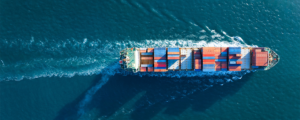EN
BlogBy: CMTrans Nov 20,2024
Ocean shipments are among the most widely used solutions in the world of international shipping, especially for long distances. After all, it is a mode of transportation that has been popular since ancient times. From the Phoenicians, one of the earliest dominant maritime civilizations dating back to 2000 B.C., through the transatlantic trade of the Seventeenth century, to the introduction of the first shipping containers in the mid-twentieth century, ocean freight has always influenced the commercial and cultural evolution of the world.
Even today, maritime cargo transportation often represents the most suitable choice for various business needs. In this article by Jiangsu Chenmao international logistics Co.,LTD, we will discover how ocean shipments work, the advantages they offer, and other useful information regarding loading methods and types of vessels.
The procedure for maritime shipments can be summarized briefly in the following steps:
Goods are packed based on their size, shape and nature;
The ocean freight forwarder books the container(s) and the necessary space on the vessel for the shipment;
The merchandise cargo is moved to the port and goes through export customs ;
After customs clearance procedures, the goods are loaded into containers and onto the ship;
Once the vessel arrives at the destination port, the container is unloaded and the goods go through import customs procedures;
After passing customs, the goods are released and ready for delivery.
As we have mentioned before, goods are loaded into containers. For transport by ocean, the handling of cargo occurs mainly in two ways: FCL (Full Container Load) and LCL (Less Container Load). Let’s have a closer look at what these two terms mean.
FCL refers to the fact that a single container is dedicated to one company and cannot be destined for other customers. The container doesn’t necessarily have to be full: the term refers to the ownership of the container itself, not its commodity.
LCL is used when a single container is loaded with merchandise from multiple senders individually, not filling the entire loading unit. It is the most convenient solution for small quantities of goods to transport.
FCL and LCL have their specific advantages and disadvantages. For a more detailed comparison, you can refer toJiangsu chenmao international logistics Co.,LTD.’s article on FCL vs. LCL.

The maritime transport industry features a wide range of specialized ships, each designed to meet specific shipping needs. Merchant ships, in particular, are classified based on purpose, size, type of cargo and more. Let’s delve into the different cargo ships and their functions in more detail.
Among the most used for sea shipments are container vessels. As the name implies, this type of ship is structured to contain large quantities of cargo compacted inside various types of containers. Container ships are available in different sizes (Panamax, Suezmax, Post-Panamax, Post-Suezmax and Post-Malaccamax) and can be structured for specific purposes. For instance, there are refrigerated container ships, designed for transporting goods at a controlled temperature (used in the shipments of food and beverages).
Along with container ships, another widely used type is bulk carriers. These are especially designed for the transport of dry cargoes in bulk quantities. The cargoes are, indeed, transported without specific packaging. There are various types of bulk carriers: conventional bulkers, geared bulkers, gearless bulkers, self-discharging bulkers and more.
There are also ships specialized for transporting liquid cargoes: tanker ships. These are divided into various types depending on the type of cargo they carry: oil tankers (for transporting crude oil and by-products), liquefied gas transport ships (for transporting LPG, LNG and other liquefied chemical gasses) and chemical product transport ships. There are other types of tanker ships: from integrated tug-barges to tanker ships for shipping wine and spirits.
Lastly, we have Ro-Ro ships (an acronym for Roll-on/Roll-off), designed for transporting wheeled vehicles: from cars to railway wagons, through industrial and agricultural machinery. These ships are available in various types: some transport only cars (PCC), others both cars and trucks (PCTC), others combine the features of both a traditional container ship and a RoRo ship (ConRo) or are regular cargo ships equipped with the RoRo structure (GenRo).
As previously mentioned, ocean shipments offer certain advantages over other international shipping services, such as air or land transport. Let’s look at them in detail.
Merchant ships are indeed designed to transport large quantities of goods, as well as to carry bulky and high-volume products. The loading capacity of these ships reduces the need for multiple shipments, offering a more efficient and sustainable approach.
Sea shipments are also ideal for handling dangerous goods. Everything is regulated by international standards, designed to ensure maximum safety and environmental protection during transport.
Sea routes connect continents and countries around the world, offering unprecedented access to global markets. This allows ships to reach the most remote destinations, ensuring companies can transport goods even to less accessible places.
Sea transport solutions are often less expensive, compared to other transport methods, especially when dealing with large volumes of goods. Based on the needs of each business, the freight forwarder will find the most suitable solution for each specific shipment.

CMTrans is the Best Freight Forwarder Parther in China, With The Best Price and Services Help You Shipping Goods From China to Worldwide.
Back to Top
Copyright © 2025 Jiangsu Chenmao International Logistics Co.,Ltd. All Rights Reserved
Design by BONTOP.